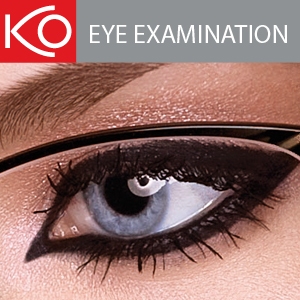Eye Examination
A thorough eye examination includes more than checking your vision. It includes all aspects of visual function and eye health. Your general health, medications you take, previous eye history and family eye history may impact on your eyes.
Both objective and subjective tests are used to determine the way your eyes focus. The tests help identify if any optical correction is needed and provide an accurate prescription to improve your vision.
Binocular tests show us how your eyes work together. In some cases eye exercises are advised to strengthen muscles in order to reduce eye strain.
Digital photography is used at every eye examination. We use this latest technology to digitally record an image of the retina at the back of the eye. This is of great value in the detection of diseases such as diabetes, high blood pressure, macular degeneration and glaucoma.
Retinal scanning using OCT. This new technology allows us to look below the surface of the retina and optic nerve further allowing early detection of eye diseases such as macular degeneration and glaucoma. The instrument does not touch the eye and there is no discomfort.
image

2nd para
Glaucoma check is a simple painless procedure to measure the pressure within the eye. Glaucoma can affect the peripheral vision and in the early stages of the disease you will not be aware of this loss. We use an instrument to measure the pressure and also a computerized perimeter to detect any early changes in sensitivity of the peripheral visual field.
Slit Lamp Biomicroscopy allows examination of the structures at the front of the eye. This includes the lids, the cornea and the lens. Cataracts developing in the lens can be detected in this way.
Direct billing to your private health fund can be done for payment for frames, lenses and contact lenses.
Commonly asked questions
How often should I have an eye examination?
An eye examination is normally recommended every two years. If an abnormality is detected, more frequent visits may be required.
What if disease is detected?
An appointment and referral to an ophthalmologist can be arranged. A report can be sent to your GP.
Can I drive after my eye examination?
A routine eye examination does not require drops to dilate your pupils and your vision will not be affected. Sometimes a follow up appointment may be required to dilate the pupils and a suitable time for you can be arranged. Pupil dilation will result in a short period of light sensitivity and blurring of vision.
When should my children’s eyes be examined?
Your child’s first eye examination is recommended by 3 years of age or before commencing preschool. If any abnormality is noticed or if there is a family history of eye problems, an eye examination at an earlier age is advised. Concerning signs include turned eye or squint, red eyes or eye rubbing, unusual head posture or white pupil reflex.
Will wearing glasses make my eyes worse?
No. this is not true. It is important for adults to wear the correct prescription for the eyes to enable clear and comfortable vision but wearing your glasses will not make your vision worse of better in the long term. It is however, very important that young children be properly corrected to allow normal vision to develop.
Should I wear sunglasses?
Yes. Good quality sunglasses protect the eyes and eyelids from UV damage just as sunscreen does for our skin. Sun cancer can develop in and on the eye after a life time exposure to UV light. Dry eye problems in later life are often due to UV damage.
